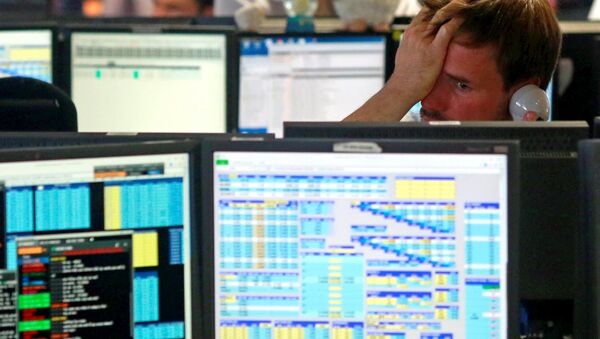The Dow Jones Index opened down by about 500 points on Friday morning, while the FTSE 250 index at the London Stock Exchange was losing over 1100 points by Friday afternoon. Besides, the sterling pound hit low bottom, slumping to pre 1981 levels.
Waiting to see what's going to happen to the Dow Jones Index when it opens at 8:30 like… #EURefResults #Brexit pic.twitter.com/BathJhBUuS
— Asian Jim (@A_A_Ron_Rodgers) June 24, 2016
"The pound will likely keep depreciating over the next two years at least. The uncertainty prevailing while the UK and EU authorities renegotiate their treaties will prevent markets from catching up again," a financial expert told Sputnik.
And with no one surprised, The Pound is taking an absolute beating. This is what happens when xenophobia trumps good sense #Brexit
— Tom Howell (@thowelliv) 24 June 2016
The source — speaking on condition of confidentiality — added that depreciation would fuel inflation and make it harder to import anything.
"This would eventually increase the cost of living for people living in Britain," the expert told Sputnik.
Brexit will also have a marked impact on jobs. While EU citizens who are currently employed in the UK, and vice versa, are unlikely to be noticeably affected by the UK-EU split, it is likely that companies will stop recruiting staff in the UK.
"Over the past few months, recruiters have stopped hiring anybody. That's because of uncertainty on possible new post-Brexit legal impediments. So, it's very likely that some jobs will be lost."
As London loses its status of EU capital's of banking and innovation and shrivels into a UK-only city, some companies could decide to decamp to more alluring places in the Union.
In for a penny, in for a pound, because now they are worth the same. #Brexit
— David Carter (@_DavidCarter_) 24 June 2016
Here's what happens now Britain has voted for #Brexit in EU referendum https://t.co/O0j822teYphttps://t.co/Clvk2idcoi
— Bloomberg (@business) 24 June 2016
Morgan Stanley has already made clear that it is relocating 2,000 key investment banking staff from London to either Dublin or Frankfurt, however they have denied any such allegations.
"Something similar could happen throughout the banking and finance industry, which could start eyeing new locations such as Zurich, Shanghai or New York," the expert underlined.
#UK votes to leave #EU. $MS’s Jacob Nell on what happens now https://t.co/goeTH5pgsx #Brexit
— Morgan Stanley (@MorganStanley) 24 June 2016
"They'll just trim down their London staff, once the UK is not part of the EU anymore."
According to Sputnik's source, the only real way to avoid such a disaster is for the British Parliament to not act upon the referendum's verdict and trigger the Artcile 50 procedure for leaving the EU.
"Constitutionally speaking, the referendum is valid only if it gets approved by MPs," the source told Sputnik.
"I know it's politically very difficult, but the risk is that, if the UK legislator don't do it, the EU could decide to make an example of the UK, in order to scare other members off the idea of leaving. That could be very painful."


